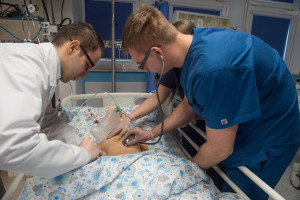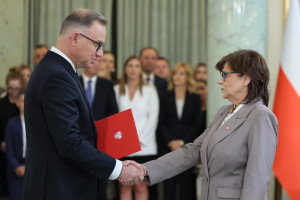Up to 36% more deaths per day due to climate. "Let's start with the time change."

- The Parliamentary Standing Subcommittee on Public Health discussed the impact of heatwaves on health and ways to counteract their effects during its last meeting.
- Heatwaves cause an increase in mortality, which can reach 36% in a single day. Scientists estimate that this increase could be as much as six-fold after 2040, said Dagmara Korbasińska-Chwedczuk.
- Recommendations should be considered to provide air-conditioned rooms in newly built or modernized hospitals, nursing homes, schools and other public institutions, suggested Patryk Wicher.
- It is also important to educate society, but the new school subject of health education does not cover this topic at all, he added.
As participants in the meeting of the Parliamentary Subcommittee on Public Health emphasized, the impact of heatwaves on human health and the work environment is obvious. However, while a minimum temperature at which workers can work has been defined, a maximum temperature has not been defined . Such a definition should be made as soon as possible, because due to climate change, minimum temperatures are becoming less frequent, and maximum temperatures – quite the opposite.
Therefore, the Ministry of Family, Labor, and Social Policy (MRPIPS), in collaboration with the Ministry of Health, is already working on an amendment to the regulation on working in hot weather . The amendment envisages, among other things, the introduction of a temperature threshold, above which employers will be required to take technical measures to lower the temperature. It also assumes the need for organizational changes at workstations when technical measures are not available to lower the temperature.
However, it is not only the working environment that is important.
Paweł Jaworski , director of the Department of Adaptation to Climate Change and Urban Policy at the Ministry of Climate and Environment, encouraged local governments to apply for funds to de-seal cities and green urban areas, which will allow for a more effective fight against high temperatures.
After 2040, the increase in mortality due to heat may be six-foldDagmara Korbasińska-Chwedczuk , director of the Department of Public Health at the Ministry of Health, reminded that we talk about a heat wave when the air temperature exceeds 30 degrees Celsius for several days.
"This is happening more and more frequently, although this July was somewhat more favorable in this regard. This places a huge burden on the health of certain groups of people, for whom prolonged heatwaves exacerbate health problems. This applies to the elderly, who often experience electrolyte imbalances, people with hypertension, allergy sufferers, and many others. Therefore, during heatwaves, we see a higher number of patients appearing in hospital emergency departments. The same is happening in primary care," said Director Korbasińska-Chwedczuk.
" Heatwaves also cause an increase in mortality – studies show up to 36% of deaths in a single day . Scientists estimate that after 2040, this increase could be as much as six-fold, due to the growing number of seniors and the intensification of climate change. We must prepare for this through local government actions that reduce the occurrence of so-called heat islands, ensure air circulation and greenery in cities, and provide access to air-conditioned spaces," she said.
She added that before each heatwave, both the Ministry of Health and the National Health Fund, guided by WHO guidelines, renew campaigns aimed at people particularly vulnerable to high temperatures. These campaigns inform people about the risks and remind them of the procedures that can reduce them, including the recommended diet during this period.
What does the heat have to do with sobering-up stations? It turns out there is a connection.Participants also discussed the issue of care for seniors who live alone and do not use institutional care during hot weather. They should not be left alone during this particularly dangerous time for their health.
As noted by MP Patryk Wicher , the Ministries of Health and Climate should consider talks with the Ministry of Construction on recommendations to provide air-conditioned rooms in newly built or modernized hospitals, nursing homes, schools and other public institutions.
- Of course, it's about patients, students, employees, but also about ensuring that anyone passing by and wanting to cool off can go inside for a moment and take advantage of this opportunity - he emphasized.
"The second issue is the need to be alert to people who may lose consciousness on the street during a heatwave . The problem is that emergency services are reluctant to respond to such cases, and this reluctance stems from concerns that the person lying on the ground is under the influence of alcohol. In such a situation, the problem arises as to where to take them. Cities are closing sobering-up stations because they are too expensive due to the requirement to have a doctor, so the emergency department remains," he pointed out.
"This brings us to the need to build a new system of sobering-up stations in the country, one that won't be as expensive for local governments to maintain as it is now. This will solve the problem of emergency rooms, and people who lose consciousness on the street in the heat will be able to count on quicker help," he argued.
"And finally, there's the issue of educating society on how to behave during hot weather. Such education should begin in schools, although the health education subject that will be introduced in the new school year doesn't address this topic at all, " MP Wicher emphasized.
"Let's start with the time change"Marek Wójcik from the Association of Polish Cities pointed out that the change in time affects the extension of the period of stay at high temperatures, so this is an issue worth taking into account.
"Regarding free access to drinking water in public spaces , a bill is ready (it will be processed soon) that would require the installation of drinking fountains in parks, schools, hospitals, train stations, and playgrounds. However, such places should be marked so that everyone knows where to find them," he proposed.
"We also have archaic regulations regarding mass events , both outdoors and indoors, that don't address today's climate reality. Yet, it's during such events that we most often encounter fainting and fainting," emphasized Marek Wójcik.
Copyrighted material - reprint rules are specified in the regulations .
rynekzdrowia












